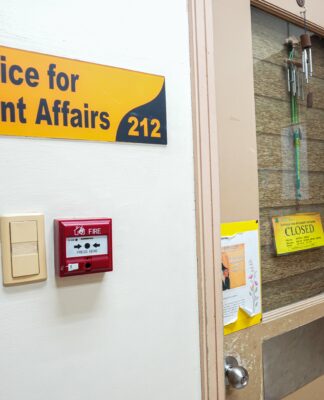CATHOLIC.
That’s what comes to mind at the mention of the name “UST.” But there is a significant number of Thomasians who aren’t. Some people think they are different, even weird, especially since they can be more vocal of their religious convictions.
Incoming Nursing senior Katherine van Koesveld and incoming B.S. Economics seniors Alvin Rosales and Bryan Balao seem like ordinary Thomasians. The only thing that makes them “different” is that they’re non-Catholics.
“My classmates don’t treat me differently. I’m just another girl in class,” Katherine, a member of the Iglesia ni Cristo (INC), told the Varsitarian. “But they do ask me a lot of questions about my faith.”
The two boys, who are classmates, are both Born-again Christians. “Sometimes, our friends would make fun of us,” Alvin said. Bryan nodded in agreement.
“Once, when we were watching television, a kissing scene came on. Our friends said, ‘Oy, bawal ‘yan sa inyo. Magkakasala kayo kapag pinanood ninyo ‘yan.’”
“It takes a little getting used to, but it’s okay,” Bryan said.
Clashing of Faiths
Like other Thomasians, the three take Theology classes. They admit to noting the differences between their faiths and Catholicism.
“Yes, there are a lot of differences (between our faiths),” Alvin said. “But I respect the Catholic faith, so I just pay attention in class instead of questioning the professor.”
Katherine is not a stranger to Theology lessons. She spent her primary and secondary education in a Catholic school, but she still has her share of difficulties in class because of her faith.
“One day in Theology class, our professor asked me why a Catholic who wishes to marry someone from INC must convert to our faith before getting married,” Katherine said. “I explained to the professor that conversion to our faith isn’t a requirement for marriage, although it is highly encouraged.” The professor, Katherine added, didn’t seem to be convinced.
But not all Theology professors are like that.
“In class, I give my students the same lecture and confidence, whether they are Catholic or not,” Asst. Prof. Catalina Lituañas of the Institute of Religion (IR) told the Varsitarian. “I ask them their ideas and opinions based on their faiths.”
Fostering Friendship
The late Pope John Paul II himself advocated unity among all the people in the world, regardless of their religion.
“The Pope’s message is clear: different religions should learn to dialogue and find common ground,” Taha Basman of the Center for Moderate Muslims, said in a press report.
Here in UST, the Center for Contextualized Theology and Ethics (CCTE) has made several ecumenical and interreligious efforts. Last February, the CCTE organized “A Dialogue with Islam”, to strengthen ties between Catholics and Muslims.
“The CCTE meets with non-Catholic Christian groups to have common worship and have dialogues with them.” Pablito Baybado, Jr., assistant to the director of the CCTE, told the Varsitarian.
Baybado admits the difficulty of addressing issues of doctrine and dogma. So, during these meetings, they talk about what the former Pontifical Council for Interreligious Dialogue president, Archbishop Michael Louis Fitzgerald, called “dialogue of life”. Dialogues of life focus on common concerns such as poverty and ethics.
“Advocacies such as what happened in Hacienda Luisita, EVAT, the Philippine Mining Act, and the like bring us together,” Baybado said. Participants have made statements against these issues. They come together, pray, reflect, and make plans of action on such matters.
“There is a need for respect and tolerance with one another,” Baybado said. “That is the main goal of ecumenical encounters.”
Although the CCTE has made these efforts and the IR has participated in interreligious studies and seminars, ecumenical and interreligious activities for non-Catholic Thomasians are yet to take place.
The IR plans such encounters for this school year.
“We plan special sessions, especially for non-Christian students, because it is difficult for them to follow the Theology lessons,” Lituañas said.
“The Pope (John Paul II) himself held that it is our basic right to practice our religion,” Baybado said. “In this ecumenical class, basic theology is to be given to the students, not to impose the Catholic faith on them, but to introduce them to the faith.” Baybado continued. “At the end of the day, they will be able to appreciate our beliefs.”
With this, the CCTE hopes that non-Catholic Thomasians can also make efforts to introduce their faith to Catholics.
And this premise seems to sit well with Katherine, Bryan, and Alvin.
“I understand the Catholic faith. I only hope Catholics would also try to understand what I believe in,” Katherine said.
“Although there may be differences in our faiths, we could still find ways to understand each other,” Bryan added. R. M. M. Forto













